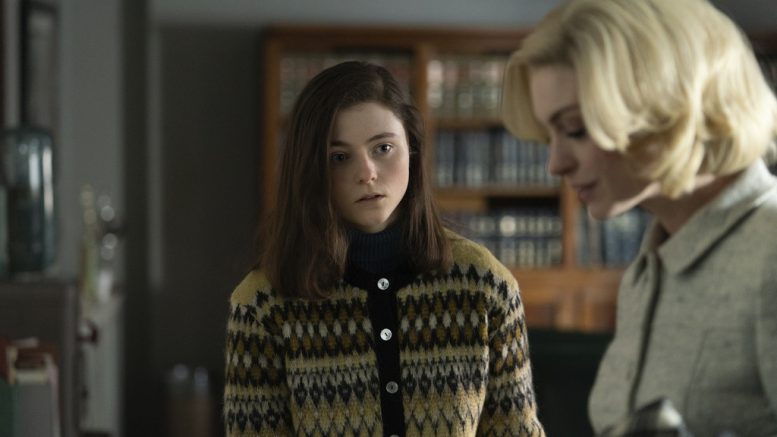The Associated Press
Something strange has happened to Eileen Dunlop, and we don’t just mean the plot of “Eileen.” The adaptation of novelist Ottessa Moshfegh’s delicious coming-of-age heroine has had a weird birth onto film.
The plot and setting haven’t changed: It’s late 1964 in a frigid coastal town in Massachusetts. “Everybody’s kind of angry here — it’s Massachusetts,” Eileen explains in one her best lines. She works as a clerk at a juvenile corrections facility, goes home to an alcoholic dad and repeats. Her whole world is a prison.
In print, she is dark and self-obsessed and deliciously willing to poke into every squeamish horror, even her own “folds and caverns.” On celluloid, she is just a plain, anti-social Jane. In print in one scene, she scratches her nether regions and pointedly uses the unwashed fingers to shake hands with a boss. In the film, she just walks away. Eileen has been neutered.
It’s not clear what has happened since Moshfegh — along with Luke Goebel — is a screenwriter as well as a producer. Moshfegh’s original creation is a “fabulous shoplifter” who keeps a dead field mouse in the glove box of her smoky Dodge Coronet and loves National Geographic issues that feature unusual, painful tribal rituals. None of that made it to the film. That leaves her too inert, too passive — wide-eyed without the naughty.
“Eileen” was always going to be a hard book to adapt, especially since it’s so internal. It’s really a character study for most of the way, then events get jolted by an unexpected outsider — a real deus ex machina — and then it evolves into a low-stakes noir thriller, right down to the film’s too heavy Hitchcockian end credits.
Thomasin McKenzie playing the titular character has a lot to do and she does it admirably, appearing mouse-ish from the outside, pulling pubic hair out of a bar of soap with delightful glee and taking the occasional flight of fancy by dreaming of executing her dad or having a hot and heavy tryst with a guard. “Get a life, Eileen. Get a clue,” says her unamusing dad.
The deus ex machina here is Anne Hathaway as the glamorous Harvard-trained psychiatrist Rebecca Saint John, who drinks cocktails, smokes furiously — “It’s a nasty habit. That’s why I like it” — dances alone in bars and doesn’t buy any ‘50s conventions. “I don’t get what’s popular,” she says. Hathaway could have pulled back the throttle a little, often overawing McKenzie’s mouse.
Hathaway’s sophisticated character is the key to unlocking Eileen, and the young woman begins mimicking the older, often wearing her dead mother’s clothes as she smokes or drinks martinis. They have a sort of flirtation — game recognizing game. “You really think you’re a normal person?” the psychiatrist asks Eileen.
While director William Oldroyd often gets lost in the heavy darkness of noir, the screenwriters have some fabulous lines, like when Saint John tells Eileen: “You remind me of a girl in a Dutch painting. You have a strange face. It’s plain but fascinating — with a beautiful turbulence.”
Or when gin-soaked dad — a great Shea Whigham — calmly destroys his daughter: “Some people, they’re the real people. Like in a movie. They’re the ones you watch, they’re the ones making moves. And other people, they’re just there, filling the space,” he says. “That’s you, Eileen. You’re one of them.”
And that’s the fate of “Eileen,” too, unfortunately. By sanding off all the dark human quirks from their deeply human heroine, the filmmakers have left us a film that’s just filling the space.
“Eileen,” a Neon release in theaters Dec. 1, is rated R for “violent content, sexual content and language.” Running time: 97 minutes. Two stars out of four.









































